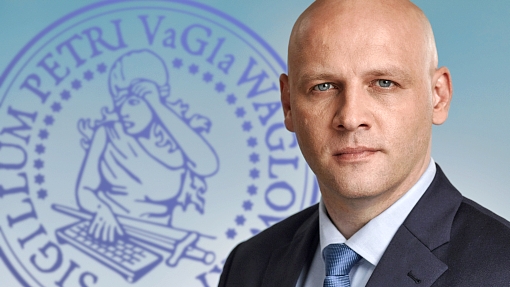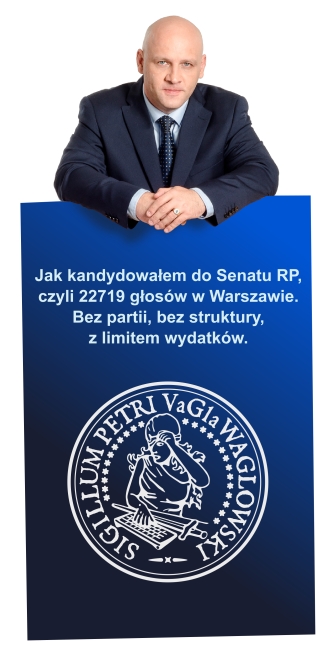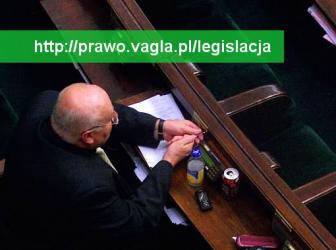Opublikowano raport OBWE na temat wolności słowa realizowanej w internecie
Niedawno, na wyjazdowym seminarium Fundacji Panoptykon, zastanawialiśmy się nad tym, czy dostęp do internetu jest prawem człowieka. Moim zdaniem nie jest (wolałbym myśleć o tym raczej jak o wolności, nie jak o prawie), ale mogę się mylić. Tymczasem Organizacja Bezpieczeństwa i Współpracy w Europie uznała dostęp do internetu za takie prawo i ogłosiła to światu.
Opublikowano notatkę prasową pt. Internet blocking practices a concern, access is a human right, says OSCE media freedom representative at launch of OSCE-wide study. Przy okazji opublikowano również raport: REPORT Freedom of Expression on the Internet Study of legal provisions and practices related to freedom of expression, the free flow of information and media pluralism on the Internet in OSCE participating States (PDF). Temat trafił do serwisów agencyjnych, stąd depesza AFP zatytułowana Internet access a fundamental human right: OSCE.
Raport OBWE ma 233 strony i napisany jest w języku angielskim. Zachęcam do lektury całości raportu. Wnioski OECD zebrano w czterech grupach tematów:
- Internet access
- Internet content regulation
- Blocking, filtering and content removal
- Licensing and liability and Internet hotlines
Fragment podsumowania na temat dostępu do internetu:
(...)
Everyone should have a right to participate in the information society and states have a responsibility to ensure citizens’ access to the Internet is guaranteed. Furthermore, Internet access policies, defined by governments, should be in line with the requirements of Article 19 of the Universal Declaration of Human Rights as well as Article 19 of the International Covenant on Civil and Political Rights and (where applicable) with Article 10 of the European Convention on Human Rights.
(...)
Fragment na temat regulacji treści (w tej części jest też o pornografii dziecięcej):
(...)
Regarding speech and content related laws and legal measures, any restriction must meet the strict criteria under international and regional human rights law. According to the European Court of Human Rights jurisprudence, a strict three-part test is required for any content-based restriction. The Court notes that the first and most important requirement of Article 10 of the Convention is that any interference by a public authority with the exercise of the freedom of expression should be lawful. The second paragraph of Article 10 clearly stipulates that any restriction on expression must be “prescribed by law”. If the interference is in accordance with law, the aim of the restriction should be legitimate based on the Article 10(2) – and concern limitations in the interests of national security, public safety or the economic wellbeing of the country, for the prevention of disorder or crime, for the protection of health of morals, or for the protection of the rights and freedoms of others. Furthermore, any restrictions need to be necessary in a democratic society, and the state interference should correspond to a “pressing social need”. The state response and the limitations provided by law should be “proportionate to the legitimate aim pursued”. Therefore, the necessity of the content-based restrictions must be convincingly established by the state. The Article 10 compatibility criteria as set out by the European Court of Human Rights should be taken into account while developing content related policies and legal measures by the participating States.
(...)
Na temat blokowania, filtrowania i usuwania z internetu treści:
(...)
There is concern that voluntary blocking mechanisms and agreements do not respect due process principles within the states in which they are used. In the absence of a legal basis for blocking access to websites, platforms and Internet content, the compatibility of such agreements and systems with OSCE commitments, Article 19 of the Universal Declaration and Article 10 of the European Convention on Human Rights is arguably problematic. Although the auhorities’ good intentions to combat child pornography and other types of illegal content is legitmate, in the absence of a valid legal basis in domestic law for blocking access to websites, the authority or power given to certain organizations and institutions to block, administer, and maintain the blacklists remains problematic. Such a “voluntary interference” might be contradictory to the conclusions of the Final Document of the Moscow Meeting of the Conference on the Human Dimension of the CSCE and in breach of Article 19 and Article 10 of the European Convention on Human Rights unless the necessity for interference is convincingly established. Both, the 1994 Budapest OSCE Summit Document and the European Court of Human Rights reiterated the importance of freedom of expression as one of the preconditions for a functioning democracy. In Budapest “[t]he participating States reaffirm[ed] that freedom of expression is a fundamental human right and a basic component of a democratic society. In this respect, independent and pluralistic media are essential to a free and open society and accountable systems of government.” Genuine, “effective” exercise of this freedom does not depend merely on the state’s duty not to interfere, but may require positive measures to protect this fundamental freedom. Therefore, a blocking system based exclusively on self-regulation or “voluntary agreements” risks being a non-legitimate interference with fundamental rights.
(...)
Na temty związane z odpowiedzialnością w "społeczeństwie informacyjnym" (również o notice and takedown):
(...)
The operation of private hotlines formed through self-regulatory means should be consistent with the principles underlying the European Convention on Human Rights. States may have a positive obligation to guarantee that hotlines respect due process principles, and their functions and practice do not contravene the the principles underlying the European Convention. States must furthermore provide adequate and effective safeguards against abuse. These should include procedures for effective judicial scrutiny of the decisions taken by the hotlines.
(...)
A oto wnioski i rekomendacje OBWE:
The open and global nature of the Internet should be ensured
Participating States need to take action to ensure that the Internet remains as an open and public forum for freedom of opinion and expression, as guaranteed by OSCE commitments, enshrined in the Universal Declaration of Human Rights, the International Covenant on Civil and Political Rights, and the European Convention on Human Rights. OSCE participating States should keep in mind the borderless nature of the Internet when developing online content regulation policies. The preservation of the global nature of the Internet requires participating States to consider regional and alternative approaches to online content regulation.
Access to the Internet should be regarded as a human right and recognized as implicit to the right to free expression and free information
Access to the Internet remains the most important pre-requisite to be part of and take part in the Information Society. Access to the Internet is one of the basic prerequisites to the right to freedom of expression and the right to impart and receive information regardless of frontiers. As such, access to the Internet should be recognized as a fundamental human right.
The right to freedom of expression is universal – also in regards to the medium and technology
The right to freedom of expression and freedom of the media were not designed to fit a particular medium, technology or platform. Freedom of expression applies to all means of communications, including the Internet. Restrictions to this right are only acceptable if in compliance with international norms and standards. Any restriction should be weighed against the public interest.
New technologies require new approaches
Typically, the stance taken by the participating States is that what is illegal and punishable in an offline form must at least be treated equally online. There are, however, several features of the Internet which fundamentally affect approaches to its governance. While rules and boundaries still exist, enforcement of existing laws, rules and regulations to digital content becomes evidently complex, problematic and at times impossible to enforce on the Internet. Participating States should develop alternative approaches adapted to the specific nature of the Internet. Participating States should also place more emphasis on Internet and media literacy projects for vulnerable groups, particularly children.
Network neutrality should be respected
Legal or technical measures regarding end-users’ access to or use of services and applications through the Internet should respect the fundamental rights and freedoms guaranteed by international human rights principles, especially freedom of expression and the free flow of information. Online information and traffic should be treated equally regardless of the device, content, author, origin or destination. Service providers should make their information management practices of online data transparent and accessible. Furthermore, information society service provision should not be subject to governmental
barriers and strict licensing regimes.Internet ‘kill switch’ plans should be avoided
Existent legal provisions allow several OSCE participating States to completely suspend all Internet communication and “switch off” Internet access for whole populations or segments of the public during times of war, states of emergency and in cases of imminent threat to national security. Reaffirming the importance of fully respecting the right to freedom of opinion and expression, the OSCE participating States should refrain from developing, introducing and applying “Internet kill switch” plans as they are incompatible with the fundamental right to information.
OSCE participating States should avoid vague legal terminology in speech-based restrictions
Definitional problems and inconsistencies exist with regards to certain speech based restrictions. Clarifications are needed to define what amounts to “extremism”, “terrorist propaganda”, “harmful” and “racist content” and “hate speech”. Legal provisions are often vague and open to wide or subjective interpretation. Any restriction must meet the strict criteria under international and regional human rights law. The necessity for restricting the right to speak and receive information must be convincingly established to be compatible with international human rights standards.
OSCE participating States should refrain from mandatory blocking of content or websites
Given the limited effectiveness of national laws and the lack of harmonization at international level to prosecute criminal online content, a number of OSCE participating States started to block access to online content deemed illegal and Web 2.0 based social media platforms situated outside their legal jurisdiction. As blocking mechanisms are not immune from significant deficiencies, they may result in the blocking of access to legitimate sites and content. Further, blocking is an extreme measure and has a very strong impact on freedom of expression and the free flow of information. Participating States should therefore refrain from using blocking as a permanent solution or as a means of punishment. Indefinite blocking of access to websites and Internet content could result to “prior restraint” and by suspending access to websites indefinitely states can largely overstep the narrow margin of appreciation afforded to them by international norms and standards.
Blocking of online content can only be justified if in accordance with these standards and done pursuant to court order and where absolutely necessary. Blocking criteria should always be made public and provide for legal redress.
Voluntary blocking and content removal arrangements should be transparent and open to appeal
Voluntary blocking measures and agreements exist in a number of OSCE participating States. However, private hotlines do not always have legal authority to require ISPs to block access to websites or to require removal of content. Any blocking system based exclusively on selfregulation or voluntary agreements between state actors and private actors have to be conceived in a way as not to interfere with fundamental rights. Furthermore, blocking criteria of hotlines and private actors are not always transparent or open to appeal. Any blocking or removal system based on self-regulation and voluntary agreements should be transparent, compatible with international norms and standards and provide for redress mechanisms and judicial remedies.
Filtering should only be encouraged as an end-user voluntary measure
OSCE participating States should encourage the use of end-user filtering software on individual home computers and in schools if their use is deemed necessary. However, the deployment of state-level upstream filtering systems, as well as government-mandated filtering systems, should be avoided. If the use of filters is encouraged by the states, users should be made aware of the potential limitations of filtering software as there are serious questions about the reliability of such tools as stand-alone solutions for child protection.
‘Three-strikes’ measures to protect copyright are incompatible with the right to information
The development of so-called “three-strikes” legal measures to combat Internet piracy in a number of participating States is worrisome. While countries have a legitimate interest to combat piracy, restricting or cutting off users’ access to the Internet is a disproportionate response which is incompatible with OSCE commitments on the freedom to seek, receive and impart information, a right which in fact should be strengthened by the Internet. Participating States should refrain from developing or adopting legal measures which could result restricting citizens’ access to the Internet. A discussion on whether or not current international standards on intellectual property protection are suited for our information society might be necessary.
Reliable information on applicable legislation and blocking statistics needs to be made available
Despite the high responsiveness of the participating States to take part in the survey, many governments expressed major difficulties in collecting the requested data, because reliable or recorded information was not available or different governmental institutions and ministries are responsible for the different aspects of the Internet. Almost no participating State had an institutional focal point on Internet matters to fall back to. It is recommended that participating States put mechanisms in place that allow for the maintenance of reliable information on Internet content regulation and statistical data pertaining to questions on blocking statistics and prosecutions for speech-related offenses committed on the Internet. These statistics and information should be made available to the public.
Participating States should also increase their efforts to better coordinate and share information on Internet content regulation.
- Login to post comments
Piotr VaGla Waglowski

Piotr VaGla Waglowski - prawnik, publicysta i webmaster, autor serwisu VaGla.pl Prawo i Internet. Ukończył Aplikację Legislacyjną prowadzoną przez Rządowe Centrum Legislacji. Radca ministra w Departamencie Oceny Ryzyka Regulacyjnego a następnie w Departamencie Doskonalenia Regulacji Gospodarczych Ministerstwa Rozwoju. Felietonista miesięcznika "IT w Administracji" (wcześniej również felietonista miesięcznika "Gazeta Bankowa" i tygodnika "Wprost"). Uczestniczył w pracach Obywatelskiego Forum Legislacji, działającego przy Fundacji im. Stefana Batorego w ramach programu Odpowiedzialne Państwo. W 1995 założył pierwszą w internecie listę dyskusyjną na temat prawa w języku polskim, Członek Założyciel Internet Society Poland, pełnił funkcję Członka Zarządu ISOC Polska i Członka Rady Polskiej Izby Informatyki i Telekomunikacji. Był również członkiem Rady ds Cyfryzacji przy Ministrze Cyfryzacji i członkiem Rady Informatyzacji przy MSWiA, członkiem Zespołu ds. otwartych danych i zasobów przy Komitecie Rady Ministrów do spraw Cyfryzacji oraz Doradcą społecznym Prezesa Urzędu Komunikacji Elektronicznej ds. funkcjonowania rynku mediów w szczególności w zakresie neutralności sieci. W latach 2009-2014 Zastępca Przewodniczącego Rady Fundacji Nowoczesna Polska, w tym czasie był również Członkiem Rady Programowej Fundacji Panoptykon. Więcej >>








hulaj dusza, piekła nie ma
Czyli, o ile dobrze rozumiem, aby jakieś ograniczenia były dopuszczalne, muszą być (1) prowadzone zgodnie z prawem, które (2) zostało wcześniej uchwalone ze względu na (3) "potrzebę społeczną"?
No to RSiUN by się kwalifikował jak najbardziej... miał blokować według ustawy ze względu na istotną potrzebę społeczną odcięcia narodu od niesłusznych treści i hazardu online. Podobnie nowe "europejskie" propozycje, też przecież najpierw się uchwali, potem zgodnie z uchwalonym pośle policjantów a potrzeba społeczna jakaś się znajdzie.
To może od razu wprowadzić dostęp na bazie whitelisty? Będzie taniej, w końcu te kilka tuzinów słusznych stron będzie się znacznie szybciej porównywać z żądaniami przeglądarek niż listę połowy stron w Internecie.
--
Powyższa wypowiedź NIE została zatwierdzona przez Główny Urząd Kontroli Stron i Postów.